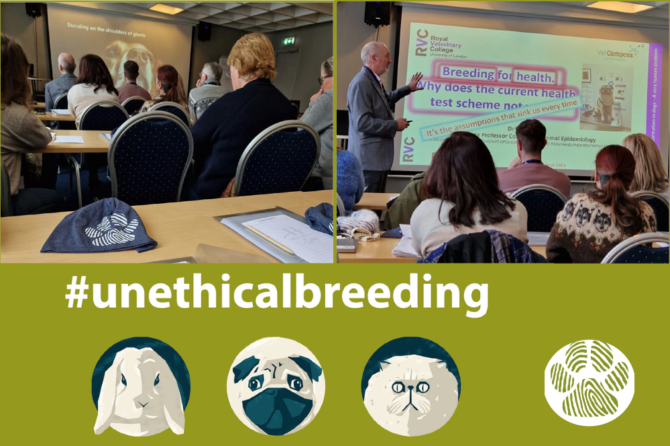
Dog breeding for the future
The Norwegian Society for Protection of Animals recently organised a two-day international symposium on dog breeding for the future at the scenic Hurdalsjøen Hotel, near Oslo. 50 participants from 10 countries met to share their knowledge, experience and research, and together find good solutions for breeding healthy dogs.
T he symposium was attended by veterinarians, geneticists, researchers, lawyers, behavioral biologists and veterinary nurses. All with a common desire; to turn dog breeding in a scientific direction where health carries much more importance than appearance.
Sky-high level of knowledge
Of the Norwegian participants, representatives from the University of Life Sciences, the Veterinary Association, the Norwegian Veterinary Nurse Association and the Norwegian Lundehund Club’s Health Committee were present. There was an overwhelming international interest in participating in the symposium. The Royal Veterinary College, the University of Cambridge, FECAVA, the All-Party Parliamentary Group for Animal welfare, the Finnish veterinary association and various animal welfare organisations were represented.
The Norwegian Society for Protection of Animals initiative against unethical breeding has reached large parts of the world. Professionals and scientists from all over the world share our concerns for the dogs’ wellbeing, and like us, believe that it is a matter of course that dogs should be bred healthy.
No scientific disagreement
There is no scientific disagreement that a hundred years of mating cousins to cousins and keeping a closed stud book causes disease. There is substantial scientific evidence showing that both the dogs’ extreme exterior and their high degree of inbreeding cause enormous disease burdens. The concept of purebreds has no scientific basis. It is based on an idea constructed by us humans. Unethical breeding has become the biggest animal welfare problem in our dogs, and it is our responsibility to fix these manmade health issues we have brought upon our innocent dogs.
With that as a starting point, the stage was set for two incredibly exciting days of lectures by some of the world’s best scientists and professionals in their field. Both genetics, veterinary medicine and national/international law were on the agenda.
The dogs have waited long enough
Although the Norwegian Food Safety Authority did not participate in this symposium, we hope that they rely on research and the EU’s guidelines for dog breeding in their ongoing work on regulating dog breeding. The upcoming regulation will be decisive for how quickly we can solve the biggest welfare problem for our dogs. It is obvious that the dogs’ right to be bred healthy, must be based on current understanding of science and available technology. Hence the new regulation of dog breeding must assimilate the current understanding of science and the available technology.
There are no good arguments for accepting dog breeding in its current form. We must start using science and prioritising health and temperament over looks. In Norway, the databases and technology to start breeding based on science are ready and available for use. There is no need to wait.
Text: The Norwegian Society for Protection of Animals (NSPA).
Photo: Stein Arne Dahl / NSPA
More information AT SOURCE.
Leave a reply

This is my first time i visit here. I found so many interesting stuff in your blog especially its discussion. From the tons of comments on your articles, I guess I am not the only one having all the enjoyment here! keep up the good work
ReplyGreat article Lot’s of information to Read…Great Man Keep Posting and update to People..Thanks
ReplyI am hoping the same best effort from you in the future as well. In fact your creative writing skills has inspired me.
ReplyWonderful article, thanks for putting this together! This is obviously one great post. Thanks for the valuable information and insights you have so provided here.
ReplyThis is such a great resource that you are providing and you give it away for free. I love seeing websites that understand the value of providing a quality resource for free. It is the old what goes around comes around routine.
Reply